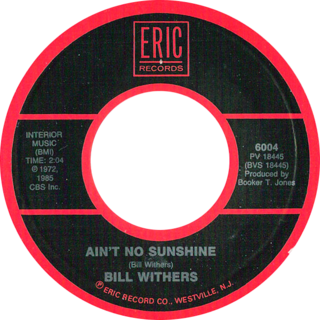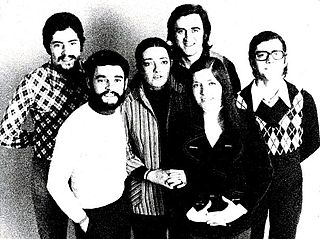
Vasiliki Papathanasiou, generally known as Vicky Leandros, is a Greek singer living in Germany. She is the daughter of singer, musician and composer Leandros Papathanasiou. In 1967, she achieved worldwide fame after gaining fourth place for the country of Luxembourg in the Eurovision Song Contest with the song "L'amour est bleu", which became a worldwide hit. She further established her career by winning the Eurovision Song Contest in 1972 with the song "Après Toi", again representing Luxembourg.
"Mack the Knife" or "The Ballad of Mack the Knife" is a song composed by Kurt Weill with lyrics by Bertolt Brecht for their 1928 music drama The Threepenny Opera. The song tells of a knife-wielding criminal of the London underworld from the musical named Macheath, the "Mack the Knife" of the title.

"Ain't No Sunshine" is a song by Bill Withers, from his 1971 debut album Just As I Am, produced by Booker T. Jones. The record featured musicians Donald "Duck" Dunn on bass guitar, Al Jackson Jr. on drums and Stephen Stills on guitar. String arrangements were done by Booker T. Jones. The song was recorded in Los Angeles, with overdubs in Memphis by engineer Terry Manning.

"Proud Mary" is a song by American rock band Creedence Clearwater Revival, written by vocalist and lead guitarist John Fogerty. It was released as a single in January 1969 by Fantasy Records and on the band's second studio album, Bayou Country. The song became a major hit in the United States, peaking at No. 2 on the Billboard Hot 100 in March 1969, the first of five singles to peak at No. 2 for the group.

"Green, Green Grass of Home", written by Claude "Curly" Putman Jr., and first recorded by singer Johnny Darrell in 1965, is a country song made popular by Porter Wagoner the same year, when it reached No. 4 on the Country chart. It was also recorded by Bobby Bare and by Jerry Lee Lewis, who included it in his album Country Songs for City Folks. Tom Jones learned the song from Lewis' version and, in 1966, he had a worldwide No. 1 hit with it.
"Mama Told Me Not to Come", also written as "Mama Told Me (Not to Come)", is a song by American singer-songwriter Randy Newman written for Eric Burdon's first solo album in 1966. Three Dog Night's 1970 cover topped the US pop singles chart. Tom Jones and Stereophonics' version also reached No. 4 on the UK Singles Chart in 2000.

"Stoned in Love" is a dance track by Chicane, with vocals performed by famed pop singer Tom Jones. It was released as a physical single on 24 April 2006. The song was later included on Chicane's third studio album, Somersault (2007), as well as Tom Jones' 2006 compilation Greatest Hits: The Platinum Edition.

Mocedades is a Spanish singing group from the Basque Country, who represented Spain in the Eurovision Song Contest in 1973 with the hit song "Eres tú". Since June 2014, Mocedades has been the name of two bands: one with Izaskun Uranga as its leader and the other with Javier Garay. A third group, El Consorcio, is composed of former Mocedades members who left the group but have continued a career together outside the Mocedades brand.

"Son of My Father" is a song popularised in 1972 by Chicory Tip.

"Love Is the Drug" is a song by the English rock band Roxy Music, from their fifth studio album, Siren (1975), released as a single in September 1975. Co-written by Bryan Ferry and Andy Mackay, the song originated as a slower, dreamier track until the band transformed its arrangement to become more dance-friendly and uptempo. Ferry's lyrics recount a man going out looking for action.
"I (Who Have Nothing)" (sometimes billed as "I Who Have Nothing") is an English language cover of the Italian song "Uno dei Tanti" (English: "One of Many"), with music by Carlo Donida and lyrics by Giulio "Mogol" Rapetti. The initial version, "Uno dei Tanti", was performed by Joe Sentieri in 1961. The song first recorded in English by Ben E. King in 1963 with new lyrics by Jerry Leiber and Mike Stoller.

"Help Yourself" is a song recorded by Welsh singer Tom Jones in 1968. The song is one of Jones' best known songs and reached number five in the UK Singles Chart in its original run. It topped the charts in both Ireland and Germany, and spent three weeks at the top spot in Australia. The American single reached Billboard peaks of number 35 pop and number three easy listening, and is still widely played on adult-standards radio.

"Carrie Anne" is a song written by Allan Clarke, Graham Nash, and Tony Hicks and released by British pop rock group the Hollies. It was recorded on 1 May 1967 and was released as a single in the same month by Parlophone Records in the United Kingdom and Epic Records in the United States. It became a hit in 1967, reaching No.3 on the UK Singles Chart. It was also a hit in the US and Canada, peaking at No.9 on both pop charts. It also reached No.4 in the Irish charts.

Roberto Zerquera Blanco is a German schlager singer, actor, and entertainer of Afro-Cuban origin. While being fairly renowned worldwide, he is one of the most successful entertainers of all times in German-speaking countries and known by 98% of all Germans.
"Waves of the Danube" is a waltz composed by Iosif Ivanovici in 1880, and is one of the most famous Romanian tunes in the world. The song has many variations throughout the piece, reminiscent of the music of Johann Strauss. Through the Viennese style variations, there is still a distinct Slavic style. In the United States, it is frequently referred to as "The Anniversary Song", a title given by Al Jolson when he and Saul Chaplin released an adaptation of the song in 1946.

"I'd Love You to Want Me" is a song by American singer-songwriter Lobo. It was released in September 1972 as the second single from his second album Of a Simple Man.
"Mamy Blue" is a 1970 song by French songwriter Hubert Giraud. Originally written with French lyrics, the song was rendered in English in 1971 to become an international hit for the Pop-Tops, Joël Daydé and Roger Whittaker. A hit in Italy with Italian lyrics for Dalida and in France in its original French for Nicoletta, "Mamy Blue" was also rendered in a number of other languages in cover versions recorded by a good number of local recording artists across continental Europe, while a "local cover" of the English-language version by Charisma reached #1 in South Africa. The song's title is sometimes spelled "Mammy Blue" in the English-speaking world.

"(Is This the Way to) Amarillo" is a song written by Neil Sedaka and Howard Greenfield. It is about a man traveling to Amarillo, Texas, to find his girlfriend Marie.

"Blow" is a song by American singer and songwriter Kesha from her first extended play (EP), Cannibal (2010). The song was released on February 1, 2011. It was written by Kesha, along with Klas Åhlund and the producers, Dr. Luke, Kool Kojak, Benny Blanco, and Max Martin. According to Kesha the song's lyrics are representative of herself and her fans. "Blow" is dominantly an electropop and dance-pop song and is described as a party anthem as it portrays a simple message of having a desire to have a good time at a club.













